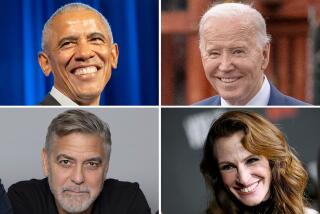Chicago link emerges as U.S. freezes more assets
- Share via
The government on Friday expanded its efforts to disrupt Osama bin Laden’s financial network, freezing the assets of dozens of his supporters including a Saudi businessman who allegedly financed a real estate deal in Chicago’s western suburbs to raise money for terrorist activity in Israel.
Yassin Kadi is among the 39 people, businesses and charities whose assets were frozen by the Treasury Department. They joined 27 other individuals and groups named in a similar order by President Bush last month.
Kadi’s extensive business activities span three continents and include dealings with relatives of the bin Laden family. His money surfaced in the Chicago area in 1991, when Kadi sent $820,000 for a land deal in Woodridge to fund the militant Islamic group Hamas, according to an FBI affidavit.
According to a U.S. government source, Kadi provided $3 million to Osama bin Laden and his al-Qaida organization. Kadi once headed a Saudi-based charity known as Mowafaq, or Blessed Relief, which according to reports is suspected of channeling money to al-Qaida.
The government has made a priority of identifying and seizing the financial assets of bin Laden and his supporters. The president’s order blocks those named from doing business with anyone in the U.S. and freezes their bank accounts. The order is not binding overseas, but most countries cooperate in seizing assets.
Included on the list released Friday are three Yemeni honey businesses and a bakery, two charities active in Afghanistan, a Pakistani money dealer, and bin Laden’s top aides and lieutenants.
Others on the list include Amin al-Haq, an Afghan-born doctor practicing in Pakistan who is identified as bin Laden’s security coordinator, and Mamoun Darkazanli, described as a well-connected bin Laden agent who is engaged in the import-export business.
Kadi is notable because he is a prominent member of Saudi society and a philanthropist active in Pakistan. He and the bin Laden family, which disavows the actions of Osama bin Laden, hold investments in a California mining company.
It remains unclear whether the Saudi government will honor the U.S. request to freeze Kadi’s assets in that country.
Kadi first drew attention in the U.S. in 1998, when he emerged as a key player in an alleged plot to funnel money to Hamas. The scheme was detailed in an FBI affidavit filed in a federal civil case to confiscate the assets of an Islamic charity and a southwest suburban man named Mohammad Salah, described as a “high-level Hamas military operative.”
Kadi wired $820,000 from a Swiss account to a Chicago area real estate developer to buy property in Woodridge, according to the affidavit. The development actually was controlled by the Quranic Literacy Institute, a charity whose officers gave Salah rental income from the property to fund Hamas’ activities, according to the affidavit.
The affidavit reveals little about Kadi. “Kadi remains shrouded in mystery,” federal prosecutors said in late 1998.
A Chicago federal grand jury investigation of whether Salah and the institute supported Hamas activities has not led to criminal charges. Kadi’s attorneys say the money was a loan to help the Quranic Literacy Institute. The institute and Salah have denied wrongdoing and ties to Hamas.
Steven Emerson, a writer specializing in Islamic terrorism, said Kadi chaired Mowafaq, the Islamic charity. The group ceased operations several years ago, according to an attorney for the charity’s trustees in a libel suit against a London newsletter. The long-running case, in which the newsletter reported a link between the group and terrorism in Egypt, ended last year after the newsletter paid a settlement and issued an apology.
Kadi sits on the board of a company called Global Diamond Resources Inc., located in the affluent oceanside town of La Jolla, Calif. Global Diamond searches for diamonds in South Africa. Also on Global Diamond’s board are representatives of the bin Laden family, which has business interests around the world.
Johann De Villiers, chairman of Global Diamond, said his company was looking to finance mining operations in the late 1990s, and made a presentation to relatives of bin Laden.
“The bin Laden family was our first Middle East investor,” De Villiers said.
De Villiers said that in 1998, a year after the bin Laden family became involved in Global Diamond, Kadi agreed to provide $3 million for the firm.
“In December 1998 we were investigated by the FBI when it came out that Osama was a rogue,” De Villiers said. He said he only learned then of bin Laden’s role in terrorism. He also said the FBI never accused his company of wrongdoing.
The government has identified other businesses and institutions affiliated with Kadi.
He is a director of the Shifa International Hospital in Islamabad, Pakistan, one of the most modern in that country.
Kadi also is an executive with a Saudi company, M.M. Badkook. The institutional food caterer supplied 15,000 meals a day to the Kuwaiti military and U.S. Army during the Persian Gulf war, according to reports in Saudi Arabian business journals.
In other developments, a grand jury indicted Faisal al-Salmi on Thursday for allegedly lying about his association with Hani Hanjour, one of the suspected hijackers aboard American Airlines Flight 77, which crashed into the Pentagon.
Al-Salmi allegedly told FBI agents a week after the hijackings that he had no knowledge of Hanjour. But Al-Salmi had spoken with Hanjour several times, authorities said.
If convicted, Al-Salmi could face 10 years in prison, a $500,000 fine or both.
Naftali Bendavid of the Chicago Tribune’s Washington Bureau contributed to this report.
More to Read
Sign up for Essential California
The most important California stories and recommendations in your inbox every morning.
You may occasionally receive promotional content from the Los Angeles Times.










